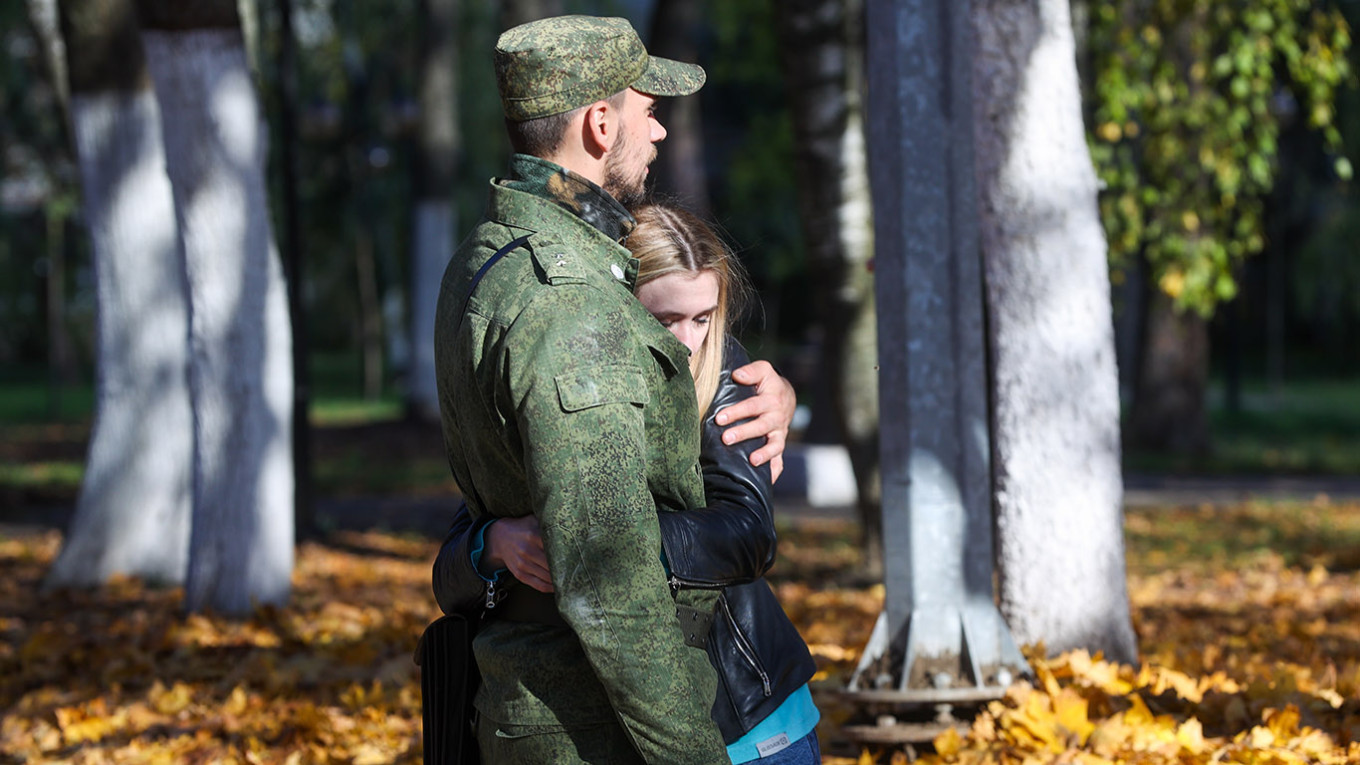The image of a devoted woman waiting for her husband at war is deeply embedded and romanticized in Russian culture, from Soviet-era songs like “Katyusha” to war films that depict the suffering and patience of soldiers' wives.
While in past wars women anxiously awaited letters, today they wait for video calls and WhatsApp messages from husbands fighting in Ukraine. Some do so with pride, others with fear — and many with a mix of emotions they can barely articulate.
Today, this narrative of devoted wives and partners waiting for their loved ones to return home is reinforced by pro-government media and social media, which encourage women to support their husbands unquestioningly. But behind these polished images lies a complex reality.
Three women spoke to The Moscow Times about their experiences as wives of contract soldiers serving in Ukraine. Each of them, who spoke on condition of anonymity, maintains an Instagram blog where they share their thoughts and emotions with thousands of followers.
Their diverse perspectives reflect a society where war is both glorified and feared — where waiting is both a source of pride and a private torment.
The patriot: Faith as a shield
In Tomsk, 27-year-old Anna* embraces the role of a soldier's wife with unwavering commitment. Her husband, an officer, has been serving in Ukraine for seven months. Unlike many, she actively avoids reading the news.
"I don't need to know what's happening. My husband tells me everything I need to know," she explains, her voice steady and confident. "I wait for his calls, and that's enough."
Soon after he was deployed, she launched an Instagram blog to share stories of resilience and national pride.

In her posts, she writes about missing her husband but also about the pride she feels knowing he is "defending Russia." When asked whom exactly he is defending, she answers without hesitation: "Russians in Ukraine."
"Every night, I light a candle and pray for him," Anna confides. "I believe with all my heart that what he's doing is right. This waiting — it's my front line. His duty is there, mine is here."
Anna sees her waiting as a duty, just as much as her husband’s service. She doesn't work; her husband's earnings are sufficient. For her, being a military wife is not just a role, but an identity.
She speaks with admiration for Russia, calling it "the best country in the world with the best president." To her, there is no question of doubt — only faith.
The pragmatist: Humor as a defense mechanism
For 24-year-old Yulia* in St. Petersburg, the experience is different. She never wanted her husband to sign a contract with the army.
"I told him not to do it, but he didn't listen. He wanted to pay off our mortgage faster," she says, a hint of resignation in her voice. Before enlisting, her husband worked as an electrical consultant, earning 60,000 rubles a month. Signing the contract brought him a signing bonus of 1.8 million rubles.
Yulia runs a blog where she tries to maintain an upbeat tone, making jokes about being a “military wife” and posting humorous memes. But behind the online persona, she is struggling with the emotional toll that her situation is taking.
"I joke about it online, but at night, I cry," she confesses. "I'm terrified every time the phone rings, afraid I'll get a call telling me he's been killed or maimed."
She recalls their last conversation before he left: "He held my face in his hands and said, 'This is for us, for our future.' But what future can we have if he doesn't come back? Sometimes I feel like I'm rehearsing for widowhood."
She admits she is trying to understand what drives men to war. "For them, maybe it's about honor. Maybe it's something deeply masculine. I don't know. I try to be supportive, but it's hard."
Despite her fears, she feels trapped in the waiting game. The war is something she cannot escape, no matter how much she tries to keep up the illusion of normalcy.
The dissenter: Love torn by ideology
Maria*, 31, from Nizhny Novgorod, never wanted her husband to go to war. Their marriage, once built on shared values, was shaken to its core when his stance toward the conflict changed.
"We were against it from the beginning," she says, her voice tinged with bitterness. "We even considered emigrating. But over time, he changed his mind. The propaganda worked. Even on him."
When he signed a military contract, she was devastated.
"We had a huge fight. I begged him not to go, but he didn't listen. And now, people at work ask me, 'Why did you let him go?' As if I had a choice."
After he left, Maria fell into a depression.
"I had a full-on breakdown. I'm on antidepressants now," she says.

Before the war, they had planned to start a family. Now, she is relieved they didn't.
"I can't imagine raising a child in this situation," she says. "It's terrifying."
What haunts Maria most is not just the waiting, but what comes after. As a psychologist herself, she understands the profound impact of war on the human psyche.
"I know what combat can do to someone," she explains, her professional knowledge adding another layer to her personal anguish. "The man who returns — if he does return — won't be the same person who left. I'm afraid of living with a stranger wearing my husband's face."
She recounts a recent video call that left her shaken: "His eyes were different — hollow. He was telling me about his day like he was reading a weather report. That's when I realized: I'm already losing him, piece by piece."
Maria works to distract herself, avoiding her husband's updates whenever possible. She no longer believes in the love story she once thought they shared.
The price of patriotic waiting
Each of these women's experiences is shaped not only by their personal relationships but also by the larger narratives constructed around them.
Social media plays a crucial role in maintaining the image of the devoted military wife. Pro-Kremlin Telegram channels and Instagram influencers celebrate these women, portraying them as symbols of strength and patriotism. State-backed initiatives likewise encourage women to remain steadfast in their support, organizing events and even distributing medals to “exemplary” military wives.
The expectation is clear: they must wait, and they must do so with pride.
But behind the facade, many are struggling. The economic incentives that drive men to enlist often leave their families in emotional turmoil. The glorification of waiting leaves no space for doubt, fear or grief. And for women like Maria, who openly oppose the war, isolation can be unbearable.
"These women are experiencing anticipatory grief — mourning someone who is still alive,” explained a Moscow-based psychologist specializing in trauma, speaking on condition of anonymity due to the sensitivity of the topic. “Society tells them to be strong, but denying these emotions can lead to severe psychological consequences."
While waiting has always been part of war, in modern Russia, it is packaged, polished and sold as something to be proud of. Yet beneath the surface, the reality is often filled with uncertainty, fear and loss.
As Anna lights her nightly candle, Yulia crafts another humorous post and Maria stares at her husband's increasingly unfamiliar face on video calls, they are all participants in this culture of waiting — each paying their own price for a war they did not choose, but that has nonetheless claimed their lives.
*Names have been changed for safety reasons.
A Message from The Moscow Times:
Dear readers,
We are facing unprecedented challenges. Russia's Prosecutor General's Office has designated The Moscow Times as an "undesirable" organization, criminalizing our work and putting our staff at risk of prosecution. This follows our earlier unjust labeling as a "foreign agent."
These actions are direct attempts to silence independent journalism in Russia. The authorities claim our work "discredits the decisions of the Russian leadership." We see things differently: we strive to provide accurate, unbiased reporting on Russia.
We, the journalists of The Moscow Times, refuse to be silenced. But to continue our work, we need your help.
Your support, no matter how small, makes a world of difference. If you can, please support us monthly starting from just $2. It's quick to set up, and every contribution makes a significant impact.
By supporting The Moscow Times, you're defending open, independent journalism in the face of repression. Thank you for standing with us.
Remind me later.






